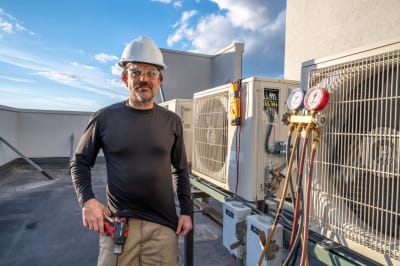Nashville, Tennessee, is a wonderful city to become an HVAC technician. As you’ll see below, the path to kick-starting a career is very direct, and professionals enjoy many perks and benefits along the way.
Naturally, candidates must acquire proper training to start a career in the field. The best way to do it is to enroll in a prominent training program with a reputation for producing successful graduates.
Thankfully, this is exactly what we have provided in the list below. Along with a quick overview of the programs, we have also included details about the course requirements and everything applicants should expect during their training.
How to Become an HVAC Technician in Nashville
Any journey to become an HVAC technician in Tennessee typically starts with the candidates sending in their high school diploma and transcript to secure admission into a training program. Those who don’t have a high school diploma often render their GED in its place.
As for the actual HVAC training, candidates may receive this in an apprenticeship arrangement where they will receive hands-on training from master HVAC technicians. The most popular arrangement, however, involves attending an academic training program after which they will graduate with either a certificate, associate degree, or bachelor’s degree.
Additionally, HVAC technicians in Tennessee are expected to receive a license before they can practice professionally and take on significant contracts.
Top HVAC Technician Schools in Nashville, Tennessee
Aspiring HVAC technicians in Nashville may consider the programs below as veritable destinations for high-quality HVAC training.
Tennessee College of Applied Technology
Nashville, TN Online + Campus
Tennessee College of Applied Technology's HVAC training offers a certificate that can be earned through 16 months of training. The program includes 1728 hours of instruction and comprehensive hands-on training.
Tuition
$201 - $256 per CreditContact
(615) 425-5500
admissions@tcatnashville.edu
Remington College
Nashville, TN Online + Campus
Remington College is another destination for high-quality HVAC technology training that offers both a diploma and a degree. The diploma program can be completed in 12 months and includes 59 credits, while the degree program can be completed in 24 months and includes 95 credits.
Email: Nashvillebeats@remingtoncollege.edu
Tuition
$19,964 - $21,147 per YearContact
(615) 889-5520
Email in Bio
Chattanooga State Community College
Chattanooga, TN Online + Campus
Chattanooga State Community College offers affordable and accelerated training for aspiring HVAC technicians in the area. Students can graduate in just 12 months and earn a diploma that can help them secure employment.
Tuition
$195 - $745 per CreditContact
(423) 697-4400
info@chattanoogastate.edu
William Moore College of Technology
Memphis, TN Campus Only
At the William Moore College of Technology, students who enroll in the HVAC program can graduate with an associate degree in applied technology. Candidates seeking an accelerated option may also go for the HVAC systems Certificate program instead.
Tuition
$235 - $525 per CreditContact
(901) 726-1977
contact@mooretech.edu
Northeast State Community College
Blountville, TN Online + Campus
Lastly, candidates seeking a fast-tracked option may consider the HVAC certificate program at Northeast State Community College. The program contains 30 credits that can be completed in 30 weeks.
Tuition
$4,104 - $16,920Contact
(423) 323-3191
info@northeaststate.edu
Explore Detailed Steps and Certification Requirements:
Explore the Nearby States for HVAC Technician Training and Education:





